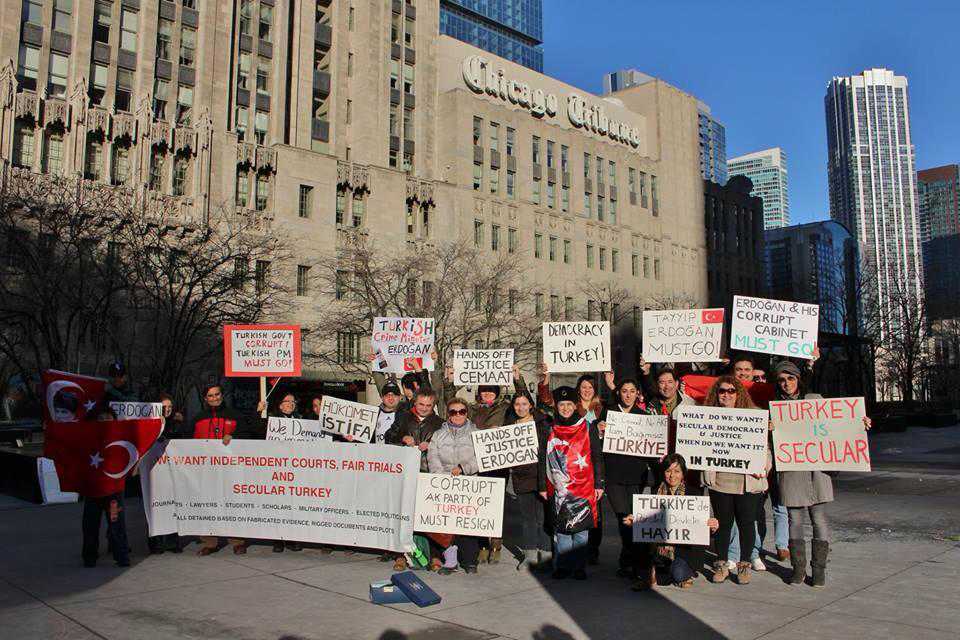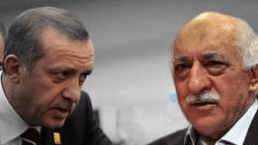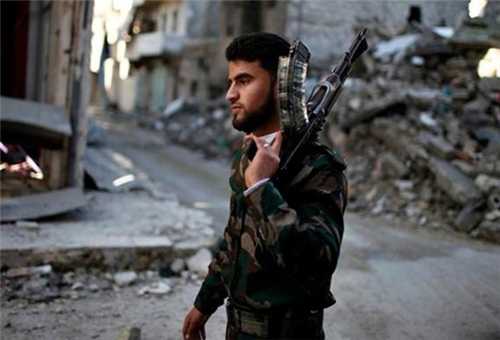28 December 2013 Press Release from Chicago Turkish Forum
Extraordinary and Unprecedented Corruption of Erdogan’s government and its consequences
Today, December 28th, 2013, the members of the Chicago Turkish Forum gathered in downtown Chicago to raise public awareness about current events in Turkey, and to ask the American public to stay in solidarity with the Turkish people who demand a secular and democratic Turkey.
Turkey is one of U.S.’s closest allies in the Near East and Europe and the current events in Turkey have immense reflections on the region and on US-Turkey relations. On December 17, 2013, Turkey’s Financial Crime Department initiated the largest corruption scandal in the history of Turkey.
– CEO of the State-owned Halk Bank was arrested with 4.5 million US dollars in cash at his home stashed in shoe boxes.
– Police detained 47 people, including sons of three cabinet ministers for receiving millions of US dollars as bribes to give illegal permits to construction tycoons with the help and approval of their fathers. The son of the Ministery of Interior affairs was among the detainees.
– The investigation was expanded to Egemen Bagis, Minister of European Union Affairs, for bribery allegations.
– Since the investigation started, Ankara’s Head of Organized Crime Unit, Chief Hakan Yuksekdag, was found dead in his car – officially pronounced as a suicide. More than 200 police officers, including the head of the current investigation, were immediately terminated or demoted, and prosecutors were relocated to other cities.
– Erdogan’s government proposed a change to the current law to force the prosecutors and the police to inform the Ministry of Interior Affairs before they start an investigation on the government. Considering the Interior Minister’s son was detained during the investigation, if the change is signed into law, it will provide unfair warning and prevent any future surprise investigation on Erdogan’s cabinet and his close circle.
– During his resignation, Erdogan Bayraktar, the Minister of Environment, claimed that the “permits for the construction projects were given with the knowledge and approval of Prime Minister Erdogan” and he added “Erdogan himself should resign.”
Contrary to the expectations, Erdogan and his government continues to undermine the separation of executive, legislative, and judicial powers secured with Turkish Constitution, and attempting to interfere and influence the outcome of Turkey’s biggest corruption investigation in history, which also involves Erdogan’s own son and himself.
Today, we gathered at the heart of Chicago as lawful citizens who are aware of the dire situation in Turkey, and who can foresee the imminent consequences in the near future. We feel that it is extremely important to raise awareness to the current events in Turkey, as the secular and modern people, the constitution, and the unique secular nature of Turkey are under immense attack.
Today thousands of people start protests against the corrupt and increasingly Islamic Erdogan government. This year alone, 6 people were killed and more than 8,000 were seriously injured, including 11 people losing their eyes and 182 people with severe head injuries–. Erdogan’s government is once again brutal against the protestors. They are doing all they can to cover up the investigations of corruption, and continue to undermine democracy.
We find this unacceptable! We are concerned about the irreversible path Erdogan has dragged Turkey into. This brings dire consequences for the region and for the world.
It is our obligation to speak, when we must and this is the time! If we fail to stand in solidarity with the modern and secular Turkey now, tomorrow would be too late. We believe it is the right of the American people to learn more about the events in Turkey and realize that the “Moderate Islam” hypothesis has major flaws in it and only a secular democratic government can be a solution for Turkey and its region.
Today we stand together with the people on the streets, who demand an uncorrupt, secular and democratic government, which respects separation of powers as dictated by the Turkish Constitution. We ask that you stand strong with them, as they may be the last man standing against the uncontrolled tyranny happening in Turkey.
Chicago Turkish Forum







